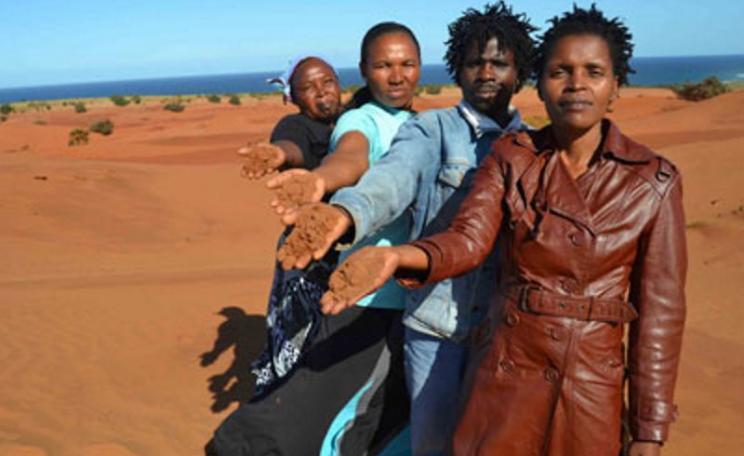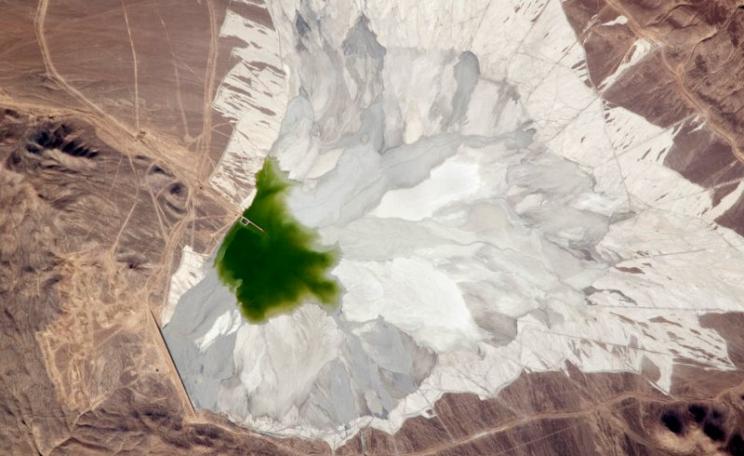If MRC is still the ultimate beneficiary, then this new arrangement would be no more than a neo-colonial facade - where some local front men get a slice for services rendered, but the substantial profits would still end up in Perth and London.
In a statement released earlier this week, London-based mining company Mineral Commodities Limited (MRC) announced its disinvestment from its controversial Xolobeni project on South Africa's 'Wild Coast' to exploit the area's abundant titanium resources.
This was the culmination of a long running campaign calling on British millionaire Graham Edwards - MRCs biggest individual shareholder with 23.6% of the company's shares - to use his weight to make the company divest from Xolobeni.
Not only was the project opposed in the UK, but it was also fiercely opposed by the majority of the Amadiba community indigenous to this stretch of South Africa's Wild Coast, where the mine is planned to span 22 kilometres.
But MRC's decision to disinvest demonstrates much more than the impact of public campaigning. For instance, War on Want's recent report, aptly titled 'The New Colonialism', evidences the extent to which British companies control Africa's mineral resources: it documents 101 companies listed on the London Stock Exchange as having operations in 37 Sub-Saharan African countries.
Together, these companies have control of an unfathomable $1 trillion of Africa's resources. Consequently, in both the report's headlines and MRC's activities we see the necessity of campaigning in Britain made clear too.
But the fight is not over yet!
Worryingly, the move to disinvest potentially depicts the adoption of more sordid antics by MRC to obscure the financial beneficiary chain of the Xolobeni mining project. This way of working is well established in the mining industry and evidenced most famously in the case of Marikana and mining company Lonmin.
For this reason, while the disinvestment campaign run by solidarity groups in the UK is being considered an important win - and one welcomed by the Amadiba community's legal representatives - it won't be celebrated as such until it is clear whether financial interest has been retained behind scenes by Edwards and MRC through a complex sub-contracting chain.
What is clear at present is that MRC has divested its 56% interest in Transworld Energy and Resources (TEM) - the entity which owns the Xolobeni mining project. Instead, a memorandum of understanding has been signed between MRC and its Black Economic Empowerment (BEE) partner Keysha.
It is here that the water gets muddied. Legal representatives of the Amadiba Crisis Committee (set up in 2007 to oppose the Xolobeni project), put it this way:
"Keysha was set up by MRC as a wholly owned subsidiary of the Xolobeni Empowerment Company (XolCo), a structure established by MRC. While XolCo has been described by MRC as a 'Black Economic Empowerment (BEE) company representing the Amadiba community at Xolobeni', our clients have never been consulted regarding XolCo and deny that it represents them."
If MRC is still the ultimate beneficiary, then this new arrangement would be no more than a neo-colonial facade - where some local front men get a slice for services rendered, but the substantial profits would still end up in Perth and London.
What monetary compensation Keysha will be obliged to pay MRC for its interest is thus far unclear; but as Dr Andy Higginbottom of Marikana Solidarity Campaign says, "If MRC is still the ultimate beneficiary, then this new arrangement would be no more than a neo-colonial facade - where some local front men get a slice for services rendered, but the substantial profits would still end up in Perth and London."
In this vein, the campaign 'win' could in actuality shroud a move by MRC to put itself itself no longer accountable for the Xolobeni project's wrongdoings, of which there are reported to be many.
Campaigner murdered - for opposing the mine?
The Amadiba community, which has been fighting against the Xolobeni mine since the mid-2000s, has this year even seen blood shed in the battle for their land. As documented in the Ecologist in May, Sikosiphi 'Bazooka' Radebem, chairman of the Amadiba Crisis Committee (ACC) was shot in the head eight times and brutally killed in front of his young son.
This reality of the dangers faced by land and environmental defenders was affirmed by a report released by Global Witness last month. Titled 'On Dangerous Ground', the report proclaims 2015 as being the worst year on record for killings of land and environmental defenders. The killing of Bazooka and other defenders across the world this year already show that this crisis is not abating.
The bigger picture of the impact felt by the Amadiba community was vividly demonstrated at an event in London this week (20th July 2016), hosted by a coalition of organisations (including The Gaia Foundation, London Mining Network, Frontline Defenders, Wretched of the Earth, Movimiento Jaguar Despierto, Marikana Miners Solidarity Campaign and War on Want).
The event included a screening of the documentary 'The Shore Break' a 2014 film directed by Ryley Grunenwald, as well as a Skype update on the situation from Nonhle Mbuthuma, the primary character in the documentary.
Nonhle is an ACC spokeswoman who has been in hiding for some time, moving constantly in response to death threats she has received from the pro-mining minority within her community. She described the statement by MRC as the neo-colonial trickery Dr Andy Higginbottom had described, noting that the statement implies, "they are still going to drive the car but they are sitting in the back seat."
Nonhle did however stress the need to keep campaigning in the UK - particularly in light of the fear that the campaign 'good news' potentially masks a more secretive agenda of mining companies. She explained:
"In England many people are shareholders of these mining companies. Send a message to them that if they continue to put their money into this they will regret it. They are putting their money in the water."
In response, the solidarity network here in the UK is committed to continue to apply pressure on Graham Edwards and MRC in a resolve to hold British-based mining companies to account and stop the scramble for Africa's valuable resources.
Action
- Meeting on Monday 25th July, 7.45 am at Barbican tube station in London to go to Telereak Trillium's London office (8am to 9am) at 140 London Wall EC2 and hand over the signatures of an Avaaz petition to Mr Graham Edwards, CEO of Telereal Trillium, asking him to truly divest from MRC's activities.
- Following a resolution by campaigners to commemorate the Marikana massacre every year until the victims' families get justice, the fourth commemoration is taking place at 4-6pm on Tuesday 16th August at South Africa House, Trafalgar Square. Join us and bring flowers, drums and musical instruments.
Also on The Ecologist:
- 'The corporate scramble for Africa's minerals: Britain's new colonialism' by Colin Todhunter.
- 'Mining, money and murder: the deadly struggle to protect South Africa's Wild Coast' by Hal Rhoades.
Rachel Lees is a writer based in London and one of The Ecologist New Voices contributors. She will be relocating to South Africa's east coast in August 2016 to work as a freelance journalist and part time communications officer for The Church Land Programme, an organisation that works with Kwa-Zulu Natal's landless poor.




